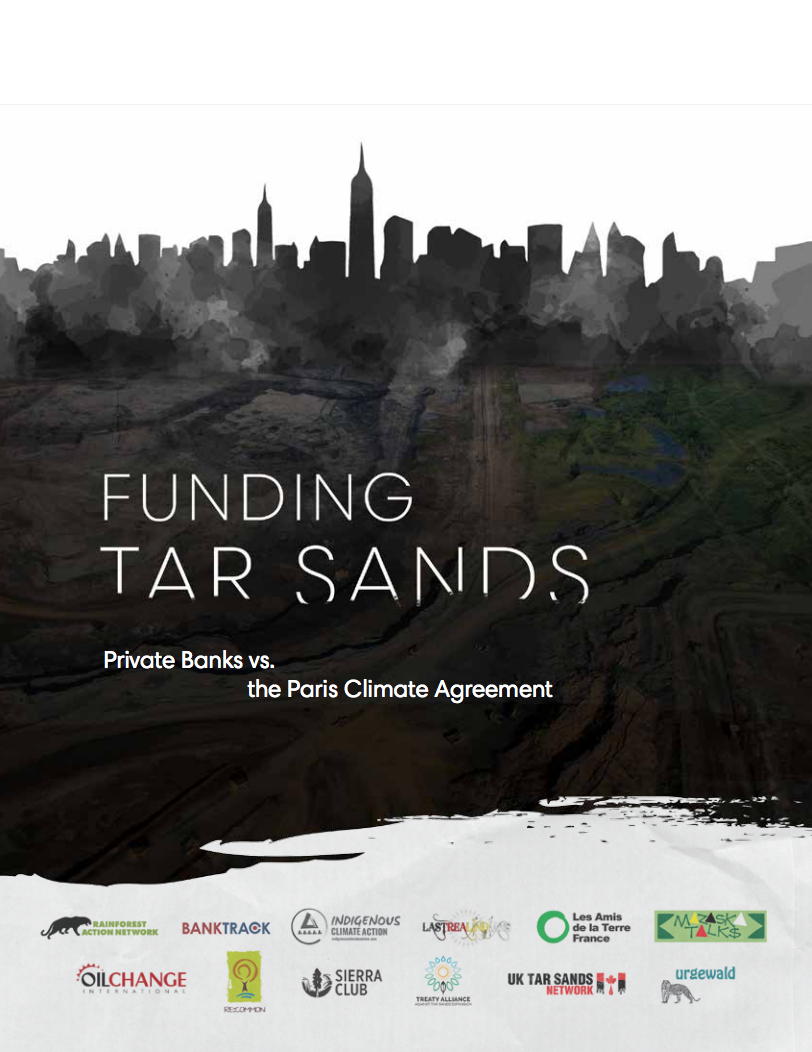
Funding Tar Sands: Private Banks vs. the Paris Climate Agreement
According to a new report released today by Rainforest Action Network, Oil Change International, and 10 organizations from around the world, commercial banks continue to finance the tar sands sector at levels that do not align with the Paris Agreement 1.5° to 2° target – and finance levels are surging in 2017.
Funding Tar Sands: Private Banks vs. the Paris Climate Agreement
Rainforest Action Network, Oil Change International, BankTrack, Indigenous Climate Action, Last Real Indians, Les Amis de La Terre France, Mazaska Talks, Re:Common, Sierra Club, Treaty Alliance against Tar Sands Expansion, UK Tar Sands Network, and urgewald
November 2017
A new report documents how global private banks are driving climate change, environmental destruction and Indigenous rights abuses by financing tar sands pipelines, mines, and the companies behind these projects.
Meeting the Paris Agreement’s climate target must entail a halt to the expansion of fossil fuel extraction and infrastructure, followed by a rapid fossil fuel phase-out. Many financial institutions have taken steps away from coal, but these alone are insufficient – banks must also restrict their financing of other extreme fossil fuels like tar sands to align their actions with their stated support for averting climate disaster and respecting Indigenous and human rights.
Key Recommendations for Banks include:
As an immediate next step toward aligning your bank’s policies and practices with the 1.5°C aim of the Paris Agreement, exceed the standard set by BNP Paribas’ tar sands policy by instituting an A-range policy, ahead of the stocktake at COP 24 in 2018.
Prohibit all finance for tar sands projects and exclude companies with tar sands expansion plans and companies with significant tar sands activity, with public reporting on implementation.
Commit to excluding all financing for all companies with tar sands operations.
Align your bank’s policies and practices with UNDRIP, including measures to ensure that your clients respect the right to FPIC for Indigenous peoples.
Key Recommendations for Investors include:
Engage with banks to reduce climate, human rights, deforestation, and reputational risks by instituting an A-range tar sands policy, and exercise voting rights and file shareholder resolutions in support of this aim.
Divest from the tar sands producers and pipeline companies analyzed in this report.
Align investment policies with the objectives of the Paris Climate Accord, UNDRIP, and the UN Guiding Principles on Business and Human Rights.
Seek robust disclosure of climate, human rights, and deforestation risks, including all financed emissions from fossil fuels and land use, consistent with the recommendations of the Task Force on Climate-related Financial Disclosures, GHG Protocol, and Global Reporting Initiative guidelines

